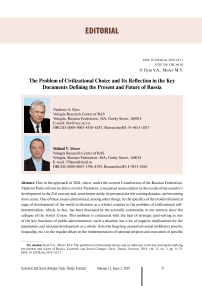The problem of civilizational choice and its reflection in the key documents defining the present and future of Russia
Автор: Ilyin Vladimir A., Morev Mikhail V.
Журнал: Economic and Social Changes: Facts, Trends, Forecast @volnc-esc-en
Рубрика: Editorial
Статья в выпуске: 3 (63) т.12, 2019 года.
Бесплатный доступ
Due to the approach of 2024, when, under the current Constitution of the Russian Federation, Vladimir Putin will not be able to run for President, conceptual issues related to the results of the country's development in the 21st century and, most importantly, its prospects for the coming decades, are becoming more acute. One of these issues (determined, among other things, by the specifics of the modern historical stage of development of the world civilization as a whole) consists in the problem of civilizational self-determination, which, in fact, has been discussed by the scientific community in our country since the collapse of the Soviet Union. This problem is connected with the lack of strategic goal-setting as one of the key functions of public administration; such a situation has a lot of negative implications for the population and national development as a whole: from the lingering unresolved social problems (poverty, inequality, etc.) to the regular delays in the implementation of national projects and execution of specific orders of the head of state. In addition, according to the results of federal and regional studies, Russian society does not have a distinct cultural and value-based vector of development; moreover, against the background of the relentless need to increase the standard of living and achieve social justice, Russian society is increasingly becoming a consumer society with all its key shortcomings such as obsession with the material component of life, the desire to achieve personal success, ignoring the historically established norms of morality, etc. In the context of the issue of civilizational choice becoming more important as well as a wide range of problems caused by its absence, we analyze the Constitution of the Russian Federation and the National Security Strategy of the Russian Federation - the key federal documents that reflect basic principles of the existing dynamics and future prospects of national development. We come to the conclusion that the ruling elites do not work to form the spiritual and moral foundations of Russian society; consequently, the goals they set are focused on solving material problems only, which makes public administration similar to corporate governance. This poses one of the key threats to national security and national development and makes it necessary to hold a broad discussion initiated primarily by the government and aimed to consider practical possibilities and prospects for the implementation of the basic principles of the social state contained in the Constitution of the Russian Federation.
Civilizational choice, constitution of the russian federation, national security strategy of the russian federation, president, russian society
Короткий адрес: https://sciup.org/147224188
IDR: 147224188 | DOI: 10.15838/esc.2019.3.63.1
Список литературы The problem of civilizational choice and its reflection in the key documents defining the present and future of Russia
- Gorshkov M.K., Krumm R., Tikhonova N.E. (Eds.). O chem mechtayut rossiyane: ideal i real'nost' [What Russians Dream About: Ideal and Reality]. Moscow: Ves' Mir, 2013. 400 p.
- Petukhov V.V. Dynamics of social sentiment of Russians and the formation of request for changes.Sotsis=Sociological Studies, 2018, no. 11, pp. 40 - 53. (In Russian).
- Gorshkov M.K., Sedova N.N. "Self-sufficient" Russians and their life priorities. Sotsis=Sociological Studies, 2015, no. 12, pp. 4-16. (In Russian).
- Karacharovskii V.V., Shkaratan O.I. Different goals of one society. Sotsis=Sociological Studies, 2019, no. 1, pp. 5-17. (In Russian).
- Stillman D. Pokolenie Z na rabote. Kak ego ponyat' i kak naiti s nim obshchii yazyk [Gen Z @ Work: How the Next Generation Is Transforming the Workplace]. Translated from English by Yu. Kondukov. Moscow: Mann, Ivanov i Ferber, 2018. 272 p.
- Sulakshin S.S. The quality and success of public policies and management. In: Seriya "Politicheskaya aksiologiya" [Series "Political Axiology"]. Moscow: Nauchnyi ekspert, 2012. 496 p. (In Russian).
- Balatsky E.V., Ekimova N.A. Economic determinants of the psychological state of society. Monitoring VTsIOM, 2008, no. 2, pp. 18-25. (In Russian).
- Zarubina N.N. The culture of wealth in the discourse of inequality: specifics of modern Russia. Obshchestvennye nauki i sovremennost'=Social Sciences and Contemporary World, 2012, no. 6, pp. 62-72. (In Russian).
- Betelin V.V. Russia needs to abandon the "economy of services" and shift to the "economy of industrial production". Ekonomist=Economist, 2019, no. 2, pp. 3-12. (In Russian).
- Yadov V.A. Russia as a transforming society (the summary of a long-standing discussion of sociologists). Obshchestvo i ekonomika=Society and Economics, 1999, no. 10-11, pp. 45-55. (In Russian).
- Golenkova Z.T., Igitkhanyan E.D. A person in changing society. Social and group preferences. Obshchestvo i pravo=Society and Law, 2003, no. 1, pp. 152-169. (In Russian).
- Zaslavskaya T.I. To the tenth anniversary of the international symposium "Where is Russia Going?" In: Zaslavskaya T.I. (Ed.). Kuda prishla Rossiya?. Itogi sotsietal'noi transformatsii [What has Russia arrived at? The results of social transformation]. Moscow: MVShSEN, 2003. Pp. 12-15. (In Russian).
- Lapin N.I. Hybrid transition and a demand for "modernization for all". Vestnik Instituta sotsiologii=Bulletin of the Institute of Sociology, 2018, vol. 9, no. 4, pp. 105-136. (In Russian).
- Toshchenko Zh.T. Fantomy rossiiskogo obshchestva [Phantoms of Russian Society]. Moscow: Tsentr sotsial'nogo prognozirovaniya i marketinga, 2015. Part 1. 668 p.


